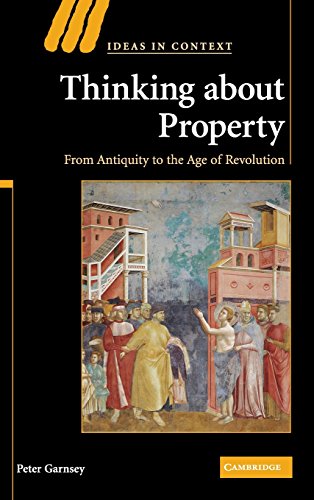Articles liés à Thinking about Property: From Antiquity to the Age...

Synopsis
This book explores the historical development of some central themes about property through the ages.
Les informations fournies dans la section « Synopsis » peuvent faire référence à une autre édition de ce titre.
À propos de l?auteur
Peter Garnsey is Director of Research in the Faculty of History at the University of Cambridge, having previously been Professor of Ancient History. His recent books include Ideas of Slavery from Aristotle to Augustine (1996), Food and Society in Classical Antiquity (1999), (with Caroline Humfress) The Evolution of the Late Antique World (2001) and (with Anthony Bowen) a translation of Lactantius' Divine Institutes (2003).
Les informations fournies dans la section « A propos du livre » peuvent faire référence à une autre édition de ce titre.
EUR 9,95 expédition depuis Etats-Unis vers France
Destinations, frais et délaisAcheter neuf
Afficher cet articleEUR 10,99 expédition depuis Allemagne vers France
Destinations, frais et délaisRésultats de recherche pour Thinking about Property: From Antiquity to the Age...
Thinking about Property : From Antiquity to the Age of Revolution
Vendeur : Better World Books: West, Reno, NV, Etats-Unis
Etat : Very Good. 1st Edition. Former library book; may include library markings. Used book that is in excellent condition. May show signs of wear or have minor defects. N° de réf. du vendeur 52734518-75
Quantité disponible : 1 disponible(s)
Thinking about Property
Vendeur : AHA-BUCH GmbH, Einbeck, Allemagne
Buch. Etat : Neu. Druck auf Anfrage Neuware - Printed after ordering - This book explores ancient 'foundational' texts relating to property and their reception by later thinkers in their various contexts up to the early nineteenth century. The texts include Plato's vision of an ideal polity in the Republic, Jesus' teachings on renunciation and poverty, and Golden Age narratives and other evolutionary accounts of the transition of mankind from primeval communality to regimes of ownership. The issue of the legitimacy of private ownership exercises the minds of the major political thinkers as well as theologians and jurists throughout the ages. The book gives full consideration to the historical development of Rights Theory, with special reference to the right to property. It ends with a comparative study of the Declarations of Rights in the American and French Revolutions and seeks to explain, with reference to contemporary documents, why the French recognised an inalienable, human right to property whereas the Americans did not. N° de réf. du vendeur 9780521876773
Quantité disponible : 1 disponible(s)
Thinking about Property: From Antiquity to the Age of Revolution (Ideas in Context, Series Number 90)
Vendeur : Ria Christie Collections, Uxbridge, Royaume-Uni
Etat : New. In. N° de réf. du vendeur ria9780521876773_new
Quantité disponible : Plus de 20 disponibles
Thinking About Property : From Antiquity to the Age of Revolution
Vendeur : GreatBookPrices, Columbia, MD, Etats-Unis
Etat : New. N° de réf. du vendeur 5386943-n
Quantité disponible : Plus de 20 disponibles
Thinking about Property: From Antiquity to the Age of Revolution (Ideas in Context, Series Number 90)
Vendeur : Best Price, Torrance, CA, Etats-Unis
Etat : New. SUPER FAST SHIPPING. N° de réf. du vendeur 9780521876773
Quantité disponible : 1 disponible(s)
Thinking about Property: From Antiquity to the Age of Revolution (Ideas in Context, Series Number 90)
Vendeur : California Books, Miami, FL, Etats-Unis
Etat : New. N° de réf. du vendeur I-9780521876773
Quantité disponible : Plus de 20 disponibles
Thinking about Property: From Antiquity to the Age of Revolution
Vendeur : Revaluation Books, Exeter, Royaume-Uni
Hardcover. Etat : Brand New. 1st edition. 267 pages. 9.00x6.25x0.75 inches. In Stock. This item is printed on demand. N° de réf. du vendeur __052187677X
Quantité disponible : 1 disponible(s)
Thinking about Property
Vendeur : moluna, Greven, Allemagne
Gebunden. Etat : New. Dieser Artikel ist ein Print on Demand Artikel und wird nach Ihrer Bestellung fuer Sie gedruckt. An intellectual history of broad scope, beginning with Plato and ending on the brink of modernity. It explores the historical development of some central themes about property, showing how these themes sparked confrontation between apologists and critics of. N° de réf. du vendeur 446951817
Quantité disponible : Plus de 20 disponibles
Thinking about Property: From Antiquity to the Age of Revolution
Vendeur : THE SAINT BOOKSTORE, Southport, Royaume-Uni
Hardback. Etat : New. This item is printed on demand. New copy - Usually dispatched within 5-9 working days 610. N° de réf. du vendeur C9780521876773
Quantité disponible : Plus de 20 disponibles
Thinking about Property
Vendeur : Books Puddle, New York, NY, Etats-Unis
Etat : New. pp. 286. N° de réf. du vendeur 26415023
Quantité disponible : 4 disponible(s)

